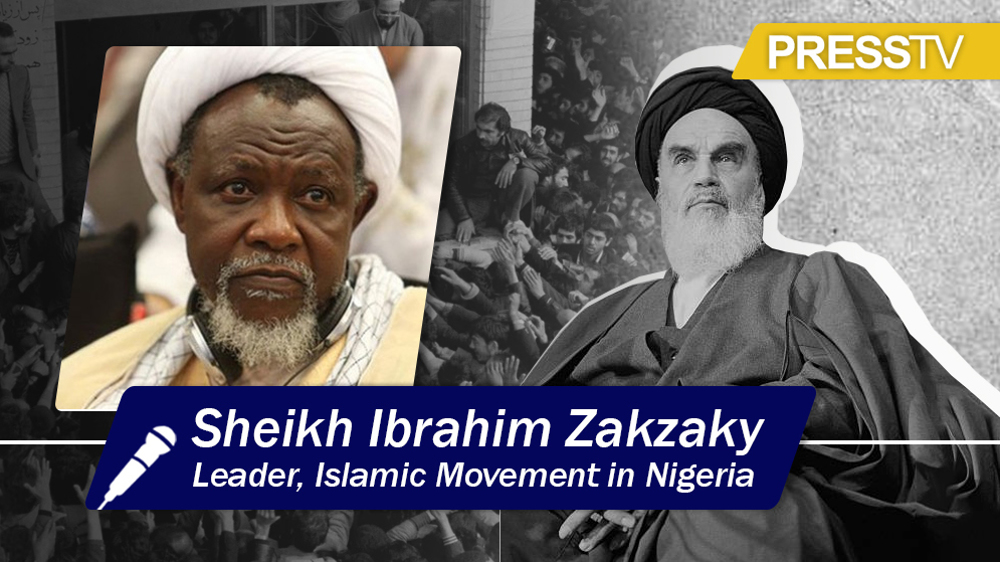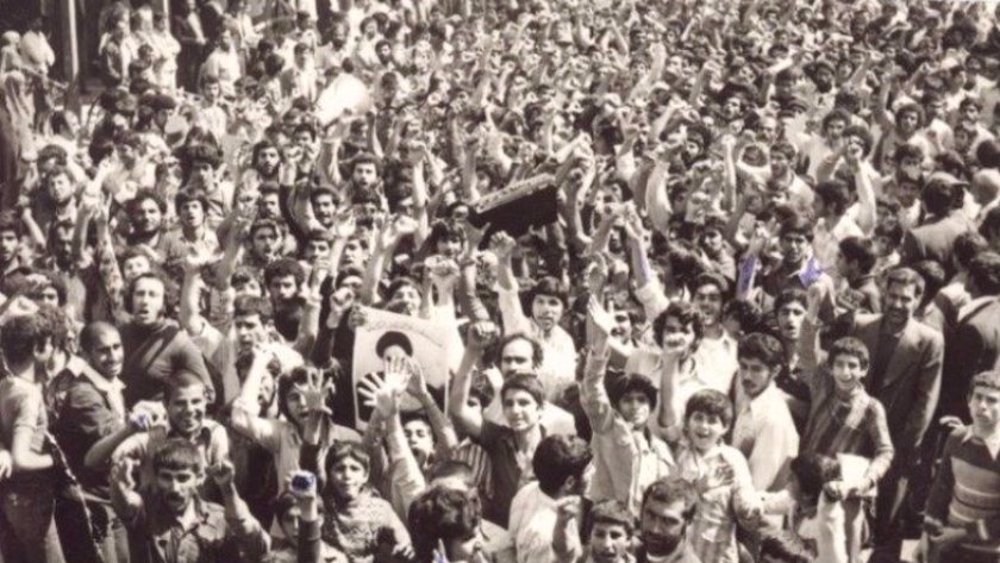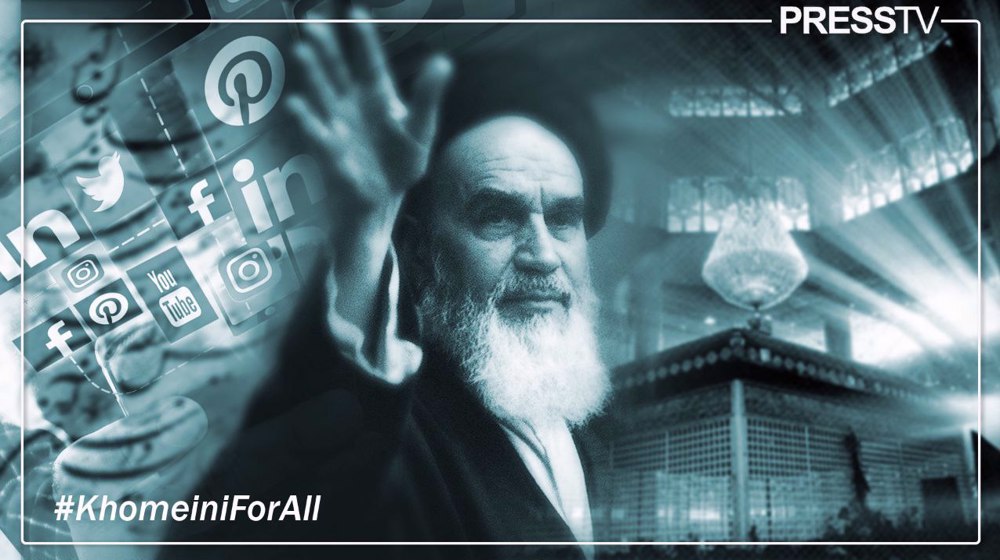#KhomeiniForAll: Netizens pay tribute to the ‘greatest revolutionary’
By Syed Zafar Mehdi
To commemorate the 34th anniversary of the passing of Ayatollah Ruhollah Khomeini, the architect of the 1979 Islamic Revolution, social media has been abuzz with messages paying glowing tributes to the greatest revolutionary in the history of revolutions.
Hashtags such as #ImamKhomeini and #KhomeiniForAll have been trending on popular social media platforms such as Twitter, Instagram and Facebook with social media users pouring their hearts out.
In a Twitter post on Sunday, the eve of Imam Khomeini’s anniversary, a user said Imam's teachings "encourage youth to be courageous and resilient in the face of challenges", urging people to "embrace his spirit and persevere in pursuit of knowledge, justice, and a brighter future."
Imam Khomeini's teachings encourage youth to be courageous and resilient in the face of challenges. Let's embrace his spirit and persevere in our pursuit of knowledge, justice, and a brighter future. #YouthInspiration #KhomeiniForAll pic.twitter.com/hNCh8ACWLT
— Hussaini Movement - India (@HMIndia19) June 3, 2023
Imam Khomeini was indeed a great believer in youth power and tremendously supported the endeavors of young Iranians in different fields, from science to arts to sports to social work.
Masih Burujurdi, Imam Khomeini's grandson, says he once went to meet him and asked him for advice. Imam’s reply was simple and straightforward: "Whatever work you want to do, do it in your youth. In old age, you will only sleep and moan.”
A Twitter user wrote that Imam Khomeini "recognized the power of young voices in shaping society", urging "meaningful dialogue, exchange ideas, and work together towards a better world."
Imam Khomeini recognized the power of young voices in shaping society. Let's engage in meaningful dialogue, exchange ideas, and work together towards a better world. #YouthLeadership #KhomeiniForAll pic.twitter.com/gZ72I6ihh1
— Adil Hyder (@adilhd23) June 3, 2023
Imam Khomeini was also a staunch supporter of weak and oppressed people worldwide and support for them was at the heart of his socio-political ideology, which later was also incorporated into Iran's Constitution and features prominently today in the country’s foreign policy.
Taking a cue from that, a user said the founder of the Islamic Revolution had a “vision of justice” that gave hope and inspiration to oppressed, weak and voiceless across the world, "reminding us of the collective struggle against tyranny and oppression".
Imam Khomeini's vision of justice inspired oppressed communities worldwide, reminding us of the collective struggle against tyranny and oppression. #KhomeiniForAll
— Ghulam Abass (@GhulamA34282178) June 3, 2023
Imam Khomeini’s extraordinary leadership during the years of struggle against the West-backed Pahlavi dictatorship, even from exile, inspired many legendary political leaders worldwide.
His leadership was based on the principles of altruism and selflessness, always leading from the front. Leader of the Islamic Revolution Ayatollah Seyyed Ali Khamenei, in one of his speeches, said Imam was truly distinguished in his personality traits that informed his leadership as well.
A Twitter user in a post said his leadership “exemplified courage and conviction, inspiring leaders worldwide to fearlessly pursue justice and serve their communities”.
Imam Khomeini's leadership exemplified courage and conviction, inspiring leaders worldwide to fearlessly pursue justice and serve their communities. #KhomeiniForAll pic.twitter.com/7XsdTsCzoO
— Mahdi Rizvi (@MehdiRizvi123) June 3, 2023
One of the disciples of Imam Khomeini is Nigeria’s Sheikh Ibrahim Zakzaky, who has faced persecution at the hands of the ruling establishment in the Western African country for years.
His children were killed in cold blood, his house was razed down, and he was ruthlessly interrogated in police custody for speaking truth to power. He refused to retreat or surrender.
A Twitter page affiliated with the office of Sheikh Zakzaky wrote that Imam believed in “justice for everyone” and in standing in solidarity with “anyone who is oppressed and wherever they are”.
...Everyone loves justice, right? That is the Imam's thought. It is meant for everyone. We stand in solidarity with anyone who is oppressed, wherever they are.”
— Sayyid Zakzaky Office (@SZakzakyOffice) June 3, 2023
–Sheikh Ibraheem Zakzaky (H)
02/06/2022.#KhomeiniForAll
Imam Khomeini’s idea of support for the oppressed and weak was the centerpiece of his political ideology, which after the Islamic Revolution saw the Islamic Republic extending support to all the oppressed, from Palestine to Yemen to Syria to Bahrain and elsewhere.
Imam Khomeini's tireless efforts wrote a Twitter user, “uplifted the spirits of oppressed people beyond Iran, empowering them to fight for their rights and dignity.”
Imam Khomeini's tireless efforts uplifted the spirits of oppressed people beyond Iran, empowering them to fight for their rights and dignity. #KhomeiniForAll #KhomeiniTheRoleModel #Khomeini
— Alam Rizvi (@Alamrizvi_) June 3, 2023
Kindly Retweet and Tweet too... pic.twitter.com/i4fysvQTEn
Some Twitter users cited popular quotes from Imam Khomeini, in which he seeks to instill hope in the hearts of hopeless people and gives them the courage to resist evil despite heavy odds.
“If our enemies besiege us economically, we are the children of "Ramadan", and if they besiege us militarily, we are the children of "Ashura",” a user cited Imam as saying.
If Our Enemies besiege us Economically we are the children of
— Hur Ali (@Aliwala72) June 3, 2023
"RAMADAN"
and if they besiege us Militarily we are the children of
"ASHURA"
~Imam Khomeini (ra)#KhomeiniForAll pic.twitter.com/1bG2w3PlJS
Another user quoted him as pointing to the significance of resistance that is driven by faith in God.
“We are a resisting people. We are not afraid. Our youth have stood against tanks, cannon fire and machine guns. So, America cannot threaten us with armed fire. We are fighters with faith and fear, we fight even though we do not have the equipment America has,” he cited Imam as saying.
“We are a resisting people. We are not afraid. Our youth have stood against tanks, cannon fire and machine guns. So America cannot threaten us with armed fire. We are fighters with faith and fear, we fight even though we do not have the equipment America has!” #KhomeiniForAll pic.twitter.com/QautyZOKcL
— Ahmerd Baba💦 (@Ahm_erd01) June 3, 2023
Imam had legions of admirers across the world, including well-known political leaders such as Nelson Mandela, the anti-apartheid hero of South Africa.
A Twitter user cited Mandela as hailing Imam Khomeini as “one of the heroes” South Africans took inspiration from while fighting the apartheid.
“Not only Imam Khomeini has been a great leader for Iran, but he has been a leader for all liberation movements in the world,” the South African great was quoted as saying.
"He was one of the heroes we continued the fight against apartheid by relying upon him. Not only Imam Khomeini has been a great leader for Iran, but he has been a leader for all liberation movements in the world." -Nelson Mandela#KhomeiniForAll pic.twitter.com/t3icDqkpuK
— Hur Ali (@Aliwala72) June 3, 2023
In July 1992, during his visit to Tehran, Mandela laid a wreath at the tomb of Imam Khomeini in acknowledgment of the Islamic Revolution founder’s firm stand against apartheid.
Imam was also a champion of women’s empowerment and women’s emancipation and advocated a greater role and active participation of women in the socio-political affairs of the country.
He saw women and men on equal footing and urged equal opportunities for both genders.
A Twitter user said the architect of the Islamic Revolution “revitalized the role of women in society, emphasizing their importance and contributions”.
Imam Khomeini revival of Islam revitalized the role of women in society, emphasizing their importance and contributions. Let's empower women and recognize their significant role. #KhomeiniForAll pic.twitter.com/TUAztN2JyD
— إبراهيم عمر (@ibrahimumarcit8) June 3, 2023
Another user said Imam Khomeini is not the name of a person, but “an ideology – the ideology of truth” – and a “backbone of resistance against the forces of imperialism”.
Khomeini ( ra) isn't a name of a person,it is an ideology, ideology of truth seekers and Haq Preachers ,backbone of resistance against each Imperialist and Anti- Islamic values , Khomeini (ra) proved that if one person determine to bring change ++#KhomeiniForAll pic.twitter.com/9mG6A9e2Eh
— صوفیه 🇵🇰 (@Ana_mahdavi313) June 3, 2023
Imam Khomeini is often described and depicted in mainstream media as someone who led the movement that saw the overthrow of the tyrannical Pahlavi regime. He is known as someone who was well-versed in politics and inflicted moral defeat on the Western imperial powers.
There is another side to the great leader that is less highlighted – his spiritual side. His unwavering and firm faith in the Divine that he believed can push mountains.
A Twitter user wrote that Imam was “constantly in a state of dhikr (prayer or meditation)” and breathed his last in the state of worship – pointing to the unbreakable bond with his Creator.
Imam Khomeini left this world while doing Zikr…
— KhomeiniForAll-Official (@KhomeiniForAll) June 3, 2023
Imam was constantly in a state of dhikr. Even in one of the instances when he regained consciousness, his lips were moving. When the doctor brought his ear close, he heard that Imam was reciting Allahu Akbar. He went from this… pic.twitter.com/h8irBC3uT9
Imam Khomeini passed away on the evening of June 3, 1989, a decade after the Islamic Revolution overthrew the Pahlavi dictatorship, paving the way for the Islamic Republic.
The waves of the movement spearheaded by the greatest revolutionary of the modern era spread far and wide, inspiring similar movements in many different parts of the world.
Syed Zafar Mehdi is a Tehran-based journalist, political commentator and author. He has reported for more than 12 years from India, Afghanistan, Pakistan, Kashmir and Middle East for leading publications worldwide.

Quds Day growing in popularity

Imam Khomeini’s political ideology is for all justice lovers: Sheikh Zakzaky

Iranians delve into Imam Khomeini’s teachings to mark the 60th anniversary of 1963 popular uprising
Iran slams US allegations against Tehran concerning Syria, condemns sanctions, Israeli violations
Iran condemns litany of hostile US actions, calls out Washington's hypocrisy
Egypt, Jordan urge ‘unity’ on Gaza, rebuilding without relocation
Putin talks Russia-Syria cooperation in first phone call with Jolani
Hamas rejects US-Israeli 'threats' on captive exchange
Iran’s oil output up nearly 13% in 2024: OPEC data
Fate of Israeli captives depends on Netanyahu's actions: Islamic Jihad
VIDEO | Gaza ceasefire on brink of collapse







 This makes it easy to access the Press TV website
This makes it easy to access the Press TV website